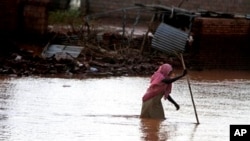GENEVA —
The International Federation of Red Cross and Red Crescent Societies is appealing for nearly $1 million to provide emergency aid to thousands of flood victims in Sudan. These floods, considered to be the worst in decades, have taken the lives of at least 36 people and injured more than 90.
These are the worst floods to have hit Sudan since 1988. Early this month, heavy rains fell in the states of Khartoum and River Nile, causing flash floods and extensive damage there and in seven other states.
The International Federation of Red Cross and Red Crescent Societies reports about 130,000 people are affected by the flooding. It says infrastructure and livelihoods have been ruined. It says 14,000 houses have been destroyed. Many of the mud houses have been washed away, while others are submerged by water.
Red Cross spokeswoman Jessica Sallabank says about 80,000 people are displaced and without shelter.
“We have reports of people camping out on the roads. They have moved to higher ground or they are lodging with people. So, we do have a humanitarian emergency on our hands. More rain is forecast. Water levels of the Blue Nile and the White Nile Rivers are still rising. So, we are concerned that this flooding could get worse, which is why international assistance is now very welcome," said Sallabank.
The hardest hit areas include the states of Khartoum, Gazira, Northern and River Nile. The Red Cross appeal aims to assist 35,000 people over the next six months. Priorities are to provide emergency shelter and relief items and emergency health care.
Sallabank says help with water, sanitation and hygiene is of paramount importance to prevent the outbreak of disease.
“Thousands of latrines and drinking water sources are being washed away so that, of course, presents a health hazard. There also is an urgent need to prevent the outbreak of diseases - diseases typically associated with floods - diarrhea. When you have got pools of stagnant water lying around there is an increase of malaria, diarrhea. I know that WHO [World Health Organization] said a few days ago that the number of mosquitoes and houseflies has increased as well. So, you have got a very, very unpleasant situation for thousands of people now," she said.
Sallabank notes some flood-stricken areas remain inaccessible, so the true extent of the emergency is not known. She says more assessments must be made to get a fuller picture of the needs. Once this is done, she says it is likely the Red Cross will have to ask for more money to take into account the increased humanitarian needs.
These are the worst floods to have hit Sudan since 1988. Early this month, heavy rains fell in the states of Khartoum and River Nile, causing flash floods and extensive damage there and in seven other states.
The International Federation of Red Cross and Red Crescent Societies reports about 130,000 people are affected by the flooding. It says infrastructure and livelihoods have been ruined. It says 14,000 houses have been destroyed. Many of the mud houses have been washed away, while others are submerged by water.
Red Cross spokeswoman Jessica Sallabank says about 80,000 people are displaced and without shelter.
“We have reports of people camping out on the roads. They have moved to higher ground or they are lodging with people. So, we do have a humanitarian emergency on our hands. More rain is forecast. Water levels of the Blue Nile and the White Nile Rivers are still rising. So, we are concerned that this flooding could get worse, which is why international assistance is now very welcome," said Sallabank.
The hardest hit areas include the states of Khartoum, Gazira, Northern and River Nile. The Red Cross appeal aims to assist 35,000 people over the next six months. Priorities are to provide emergency shelter and relief items and emergency health care.
Sallabank says help with water, sanitation and hygiene is of paramount importance to prevent the outbreak of disease.
“Thousands of latrines and drinking water sources are being washed away so that, of course, presents a health hazard. There also is an urgent need to prevent the outbreak of diseases - diseases typically associated with floods - diarrhea. When you have got pools of stagnant water lying around there is an increase of malaria, diarrhea. I know that WHO [World Health Organization] said a few days ago that the number of mosquitoes and houseflies has increased as well. So, you have got a very, very unpleasant situation for thousands of people now," she said.
Sallabank notes some flood-stricken areas remain inaccessible, so the true extent of the emergency is not known. She says more assessments must be made to get a fuller picture of the needs. Once this is done, she says it is likely the Red Cross will have to ask for more money to take into account the increased humanitarian needs.




